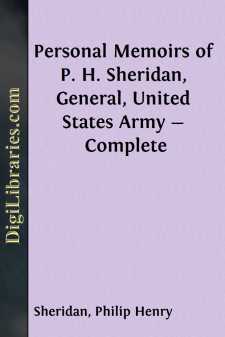Categories
- Antiques & Collectibles 13
- Architecture 36
- Art 48
- Bibles 22
- Biography & Autobiography 813
- Body, Mind & Spirit 142
- Business & Economics 28
- Children's Books 14
- Children's Fiction 11
- Computers 4
- Cooking 94
- Crafts & Hobbies 4
- Drama 346
- Education 46
- Family & Relationships 57
- Fiction 11828
- Games 19
- Gardening 17
- Health & Fitness 34
- History 1377
- House & Home 1
- Humor 147
- Juvenile Fiction 1873
- Juvenile Nonfiction 202
- Language Arts & Disciplines 88
- Law 16
- Literary Collections 686
- Literary Criticism 179
- Mathematics 13
- Medical 41
- Music 40
- Nature 179
- Non-Classifiable 1768
- Performing Arts 7
- Periodicals 1453
- Philosophy 64
- Photography 2
- Poetry 896
- Political Science 203
- Psychology 42
- Reference 154
- Religion 513
- Science 126
- Self-Help 84
- Social Science 81
- Sports & Recreation 34
- Study Aids 3
- Technology & Engineering 59
- Transportation 23
- Travel 463
- True Crime 29
Personal Memoirs of P. H. Sheridan, General, United States Army - Volume 2
Categories:
Description:
Excerpt
CHAPTER I.
ORGANIZING SCOUTS—MISS REBECCA WRIGHT—IMPORTANT INFORMATION—DECIDE TO MOVE ON NEWTOWN—MEETING GENERAL GRANT—ORGANIZATION OF THE UNION ARMY—OPENING OF THE BATTLE OF THE OPEQUON—DEATH OF GENERAL RUSSELL —A TURNING MOVEMENT—A SUCCESSFUL CAVALRY CHARGE—VICTORY—THREE LOYAL GIRLS—APPOINTED A BRIGADIER-GENERAL IN THE REGULAR ARMY —REMARKS ON THE BATTLE.
While occupying the ground between Clifton and Berryville, referred to in the last chapter of the preceding volume, I felt the need of an efficient body of scouts to collect information regarding the enemy, for the defective intelligence-establishment with which I started out from Harper's Ferry early in August had not proved satisfactory. I therefore began to organize my scouts on a system which I hoped would give better results than bad the method hitherto pursued in the department, which was to employ on this service doubtful citizens and Confederate deserters. If these should turn out untrustworthy, the mischief they might do us gave me grave apprehension, and I finally concluded that those of our own soldiers who should volunteer for the delicate and hazardous duty would be the most valuable material, and decided that they should have a battalion organization and be commanded by an officer, Major H. K. Young, of the First Rhode Island Infantry. These men were disguised in Confederate uniforms whenever necessary, were paid from the Secret-Service Fund in proportion to the value of the intelligence they furnished, which often stood us in good stead in checking the forays of Gilmore, Mosby, and other irregulars. Beneficial results came from the plan in many other ways too, and particularly so when in a few days two of my scouts put me in the way of getting news conveyed from Winchester. They had learned that just outside of my lines, near Millwood, there was living an old colored man, who had a permit from the Confederate commander to go into Winchester and return three times a week, for the purpose of selling vegetables to the inhabitants. The scouts had sounded this man, and, finding him both loyal and shrewd, suggested that he might be made useful to us within the enemy's lines; and the proposal struck me as feasible, provided there could be found in Winchester some reliable person who would be willing to co-operate and correspond with me. I asked General Crook, who was acquainted with many of the Union people of Winchester, if he knew of such a person, and he recommended a Miss Rebecca Wright, a young lady whom he had met there before the battle of Kernstown, who, he said, was a member of the Society of Friends and the teacher of a small private school. He knew she was faithful and loyal to the Government, and thought she might be willing to render us assistance, but he could not be certain of this, for on account of her well known loyalty she was under constant surveillance. I hesitated at first, but finally deciding to try it, despatched the two scouts to the old negro's cabin, and they brought him to my headquarters late that night....










